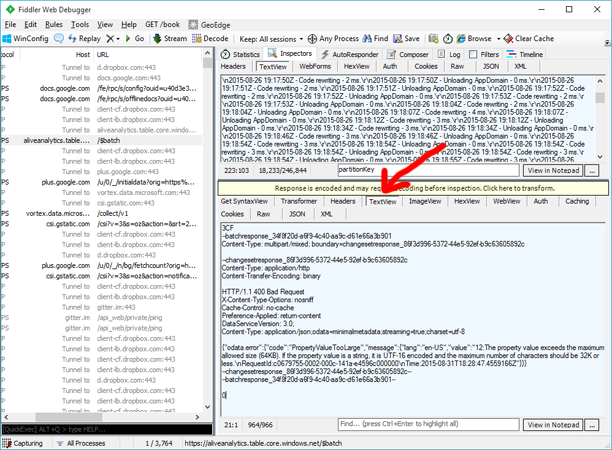Today I was fixing Unexpected response code for operation : 12 exception thrown from ExecuteBatch method of Microsoft.WindowsAzure.Storage.Table.CloudTable. The exception doesn’t have much useful information to aid debugging. Both InnerException and Data properties are empty.

Quick search shows that this exception could mean pretty much anything, but common error scenarios follow a pattern.
- Unexpected response code for operation : 99 - because the batch operation is limited to 100 elements.
- Unexpected response code for operation : 1 - the second
ITableEntityhas a differentPartitionKeyor the sameRowKeythan the first one
Unexpected response code for operation errors indicate a zero-based index of the element whose processing triggered an exception. Why would the thirteenth element trigger an exception in my app? Following Guarav’s suggestion in the comment I ran Fiddler and found that Azure’s exceptions actually carry useful debugging information!
Run Fiddler. In the left side pane, find the entry associated with your app’s communication with Azure. In my case, the hostname was <tablename>.table.core.windows.net, the URL was $/batch and the process was iisexpress.
Then, in the bottom-right pane click TextView to see the server’s response

The text view contained more detailed error information:
{"odata.error":{"code":"PropertyValueTooLarge","message":{"lang":"en-US","value":"12:The property value exceeds the maximum allowed size (64KB). If the property value is a string, it is UTF-16 encoded and the maximum number of characters should be 32K or less.\nRequestId:c0679755-0002-000c-141a-e4596c000000\nTime:2015-08-31T18:28:47.4559166Z"}}}
It looks like I tried to send too big of a payload. TextView in the top-right pane shows exactly my request, where the thirteenth element was indeed too long. For now, I’ll trim the string since the information isn’t all that useful,
public const int AZURE_STRING_MAX_LENGTH = 32000;
. . .
if (sourceData.Length > AZURE_STRING_MAX_LENGTH)
{
myTableEntity.Data = sourceData.Substring(0, AZURE_STRING_MAX_LENGTH);
}
# Another approach
A much simpler approach is apparent when you catch the specific exception type. This is a `StorageException` and its `RequestInformation` property contains more information.
```csharp
catch (StorageException ex)
{
var innerException = ex.RequestInformation.Exception;
```